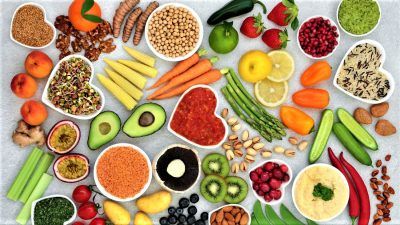5 spices with superpowers

The science is in and experts agree that spices not only improve the flavour of our food but also enhance our health. This 2019 review stated:
“There is now ample evidence that spices and herbs possess antioxidant, anti-inflammatory, antitumorigenic, anticarcinogenic, and glucose- and cholesterol-lowering activities as well as properties that affect cognition and mood.”
So let’s take a look at five of the most popular spices and their individual superpowers.
1. Turmeric
A golden spice with a myriad of health benefits, turmeric is a true example of medicinal food.
The superhero compound in turmeric is called curcumin – a very strong antioxidant with anti-inflammatory properties. Its antioxidant capacity means it goes around disabling those pesky free radicals that can damage your cells, DNA, enzymes, fatty acids and lead to disease. On top of being a powerful antioxidant, curcumin also stimulates your body’s own defences and antioxidant compounds, making them more effective.
Turmeric has been shown to improve inflammatory bowel conditions such as Crohn’s, IBS or ulcerative colitis, has cancer-inhibiting properties, can protect the heart from cholesterol and may even reduce the symptoms of depression and improve mood.
A big problem is that it’s hard to get enough curcumin from the powder or root alone – even if you use it liberally. But there is a smart solution – always combine it with black pepper. Black pepper contains piperine, which increases our absorption of curcumin by up to 2,000 per cent! Many turmeric supplements contain piperine but it’s good to follow this rule in the kitchen too.
Click here to read more about Turmeric in our A-Z of Foods.
2. Cinnamon
The sweet spice of cinnamon is just as sweet for our health, thanks to the compound cinnamaldehyde.
As well as being a healthy simple swap for sugar to sweeten dishes, several studies suggest it may lower blood sugar levels in those with type 2 diabetes. Cinnamon may also be good for our heart by reducing cholesterol and triglyceride levels, which, according to , is “especially important for people with diabetes who are at greater risk for developing heart disease.”
Studies show that cinnamon can also help with inflammation, fend off free radicals that can damage your cells, and fight bacteria.
Researchers are also exploring whether cinnamon could be used to treat Alzheimer’s disease and other neurological disorders as it has been shown to improve cognitive ability.
3. Ginger
One of the most popular ingredients in the world, ginger has a million uses and is amazing for your health.
Ginger contains several potent biochemicals of which gingerols – one of the phenolic compounds – have the strongest effects. Gingerols are very strong antioxidants, protecting our tissues from free radical damage and they have antimicrobial properties, helping fight infection. Gingerols hinder the production of inflammatory molecules in the body, thus being a natural anti-inflammatory, calming angry tissues in our joints, bowels or airways.
Probably the best-known benefit of ginger is that it can help you combat nausea – whether due to stomach upset, motion sickness, pregnancy or even chemotherapy, ginger is the hero you need.
Lower down the digestive tract, it can relieve bloating, cramping and general discomfort. Most people react well to ginger and enjoy its benefits but if you take very high doses, it can cause heartburn. However, small doses have actually been shown to prevent acid reflux and heartburn so it’s all about finding the right balance.
Ginger is a favourite in the time of colds and flus but it can even help with asthma and allergic coughs because it helps to relax the airway muscles so they don’t overly contract, which helpsyou breathe easier and cough less.
It also works wonders for relieving arthritis and has been shown to have a neuroprotective effect – helping to protect our nerves against damage and prevent neurodegenerative diseases such as Alzheimer’s and Parkinson’s.
Click here to read more about ginger in our A-Z of Foods.
4. Garlic
Technically not a spice but garlic is too good to ignore. Garlic is a true powerhouse with many sulphur phytochemicals which are stronger than those in onions and offer a number of health benefits.
These phytochemicals act as antioxidants and help protect our bodies from free radicals, the nasty by-products of metabolism, including protecting your blood vessels. They are also anti-inflammatory and help to fight infection.
As well as protecting the walls of our veins and arteries, garlic’s sulphur compounds can do even more. Some of the phytochemicals slightly reduce blood clotting, which helps lower the risk of thrombosis – a blood clot blocking blood supply to a vital organ. If you’re already taking blood-thinning medication though, ask your GP about garlic to stay on the safe side!
Garlic can also moderately reduce the levels of triglycerides (fats) and cholesterol in the blood and helps lower blood pressure by relaxing blood vessel walls. If you’re worried about your heart, garlic is your friend!
Despite all these benefits, garlic is probably best known for its antibacterial properties and rightly so. It helps fight infection but has also been shown to be able to prevent infection by some bacteria and yeast.
Click here to read more about garlic in our A-Z of Foods.
5. Chilli pepper
Chilli peppers contain a compound called capsaicin. It’s what makes them spicy and it’s also what makes them super-spices. A 2015 review examined the health claims made by chilli pepper proponents and found that capsaicin “has intriguing potential for health promotion.”
Chilli peppers have been shown to have beneficial effects on metabolic health, insulin control and weight management, therefore reducing the risk of obesity, diabetes and cardiovascular disease. However, people who already regularly eat spicy food may not experience the same weight loss benefits.
Some studies also suggest that capsaicin has an anti-cancer effect as it “has been shown to alter the expression of several genes involved in cancer cell survival, growth arrest, angiogenesis and metastasis.” Although there have unfortunately been many studies exploring the effects of capsaicin on cancer in animals, more human data is needed.
But it is for its pain relief properties that capsaicin is most commonly lauded. By reducing the number of pain signals sent to the brain, it eases discomfort from conditions such as arthritis and migraines. For this reason, it can be found in many over-the-counter topical pain-relief lotions.
These are just five of many spices that have amazing health benefits and can form part of a healthy plant-based diet. There are many more so mix it up because you know what they say, variety is the spice of life. And if you’re looking for recipes including all of these spices and more, be sure to check out Vegan Recipe Club for some inspiration.







